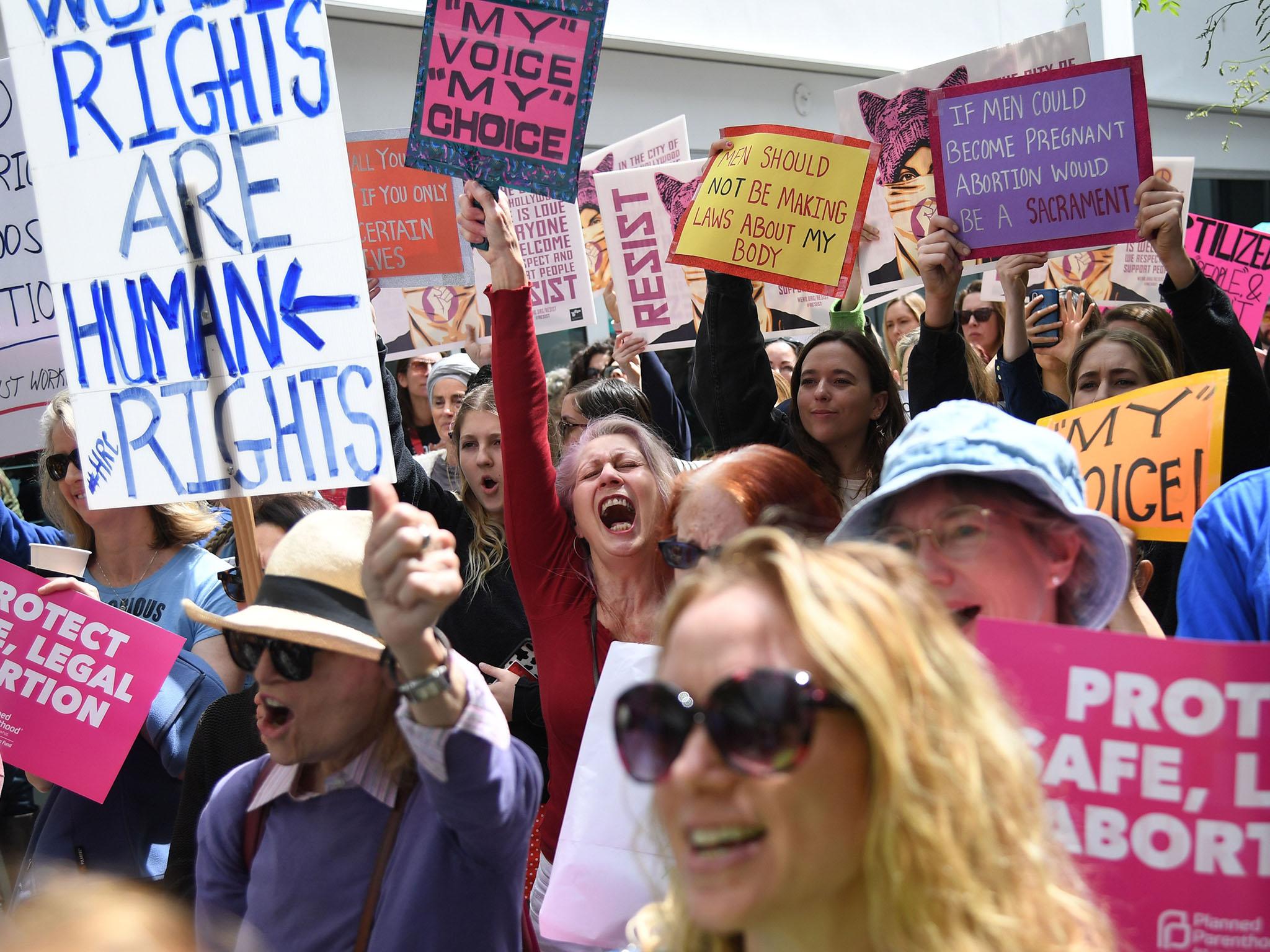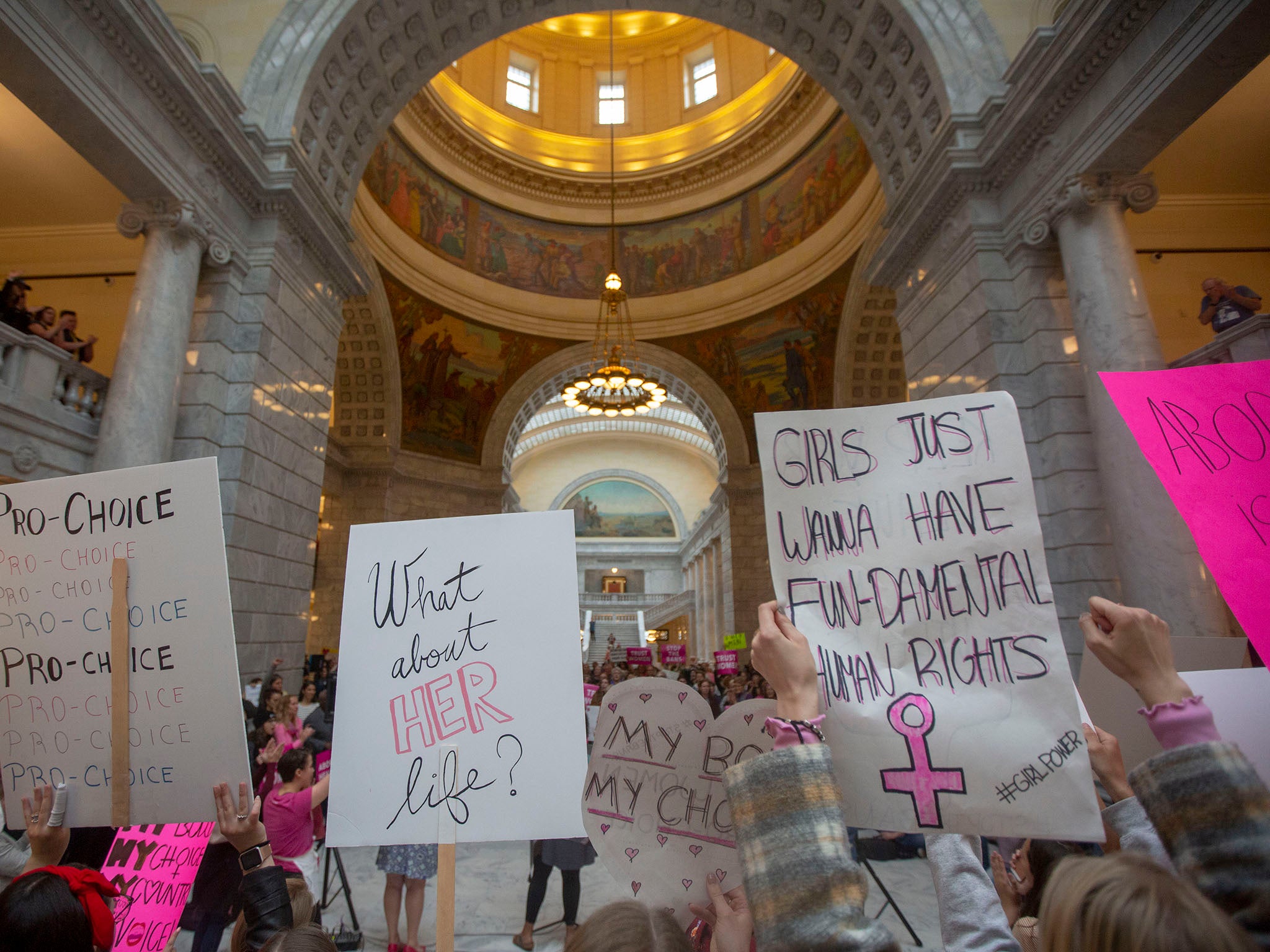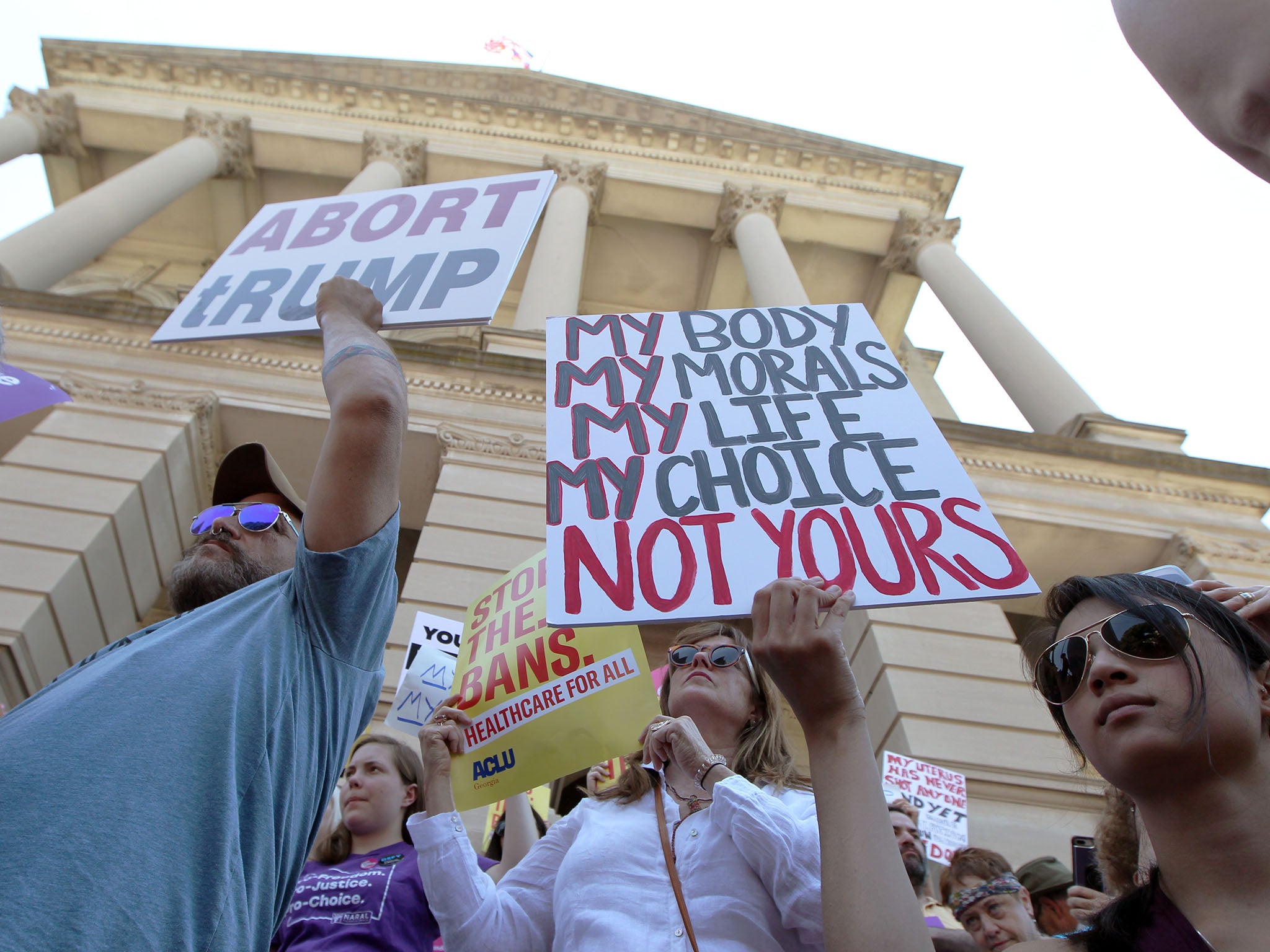Abortion in the US: Vermont protects pro-choice rights while other states seek to follow Alabama’s example
The fallout of Alabama’s crackdown on abortion shocked the world. Kate Taylor and Julie Turkewitz follow the journey of the few pro-choice US states

A district attorney in Utah is refusing to enforce a new law banning abortions after 18 weeks. In Colorado, the secretary of state is barring her staff from taking work-related trips to Alabama, a protest against that state’s decision two weeks ago to set the strictest abortion limits in the country. And in Vermont, Democrats have approved a measure meant to protect abortion rights, and supporters have pleaded with the state’s Republican governor, Phil Scott, to sign it.
The Vermont bill, aimed at providing some of the strongest protections for abortion rights in the nation, came as crowds of supporters for such rights gathered on Tuesday outside statehouses and on the steps of the Supreme Court to protest abortion bans like Alabama’s.
In Vermont, the bill would prohibit the government from interfering in any way with the right to have an abortion. It would not change the status quo in Vermont, where there are no legal limits on when or under what circumstances a woman can decide to end a pregnancy. But supporters say that the bill sends a resonant message to the nation about Vermont’s views on abortion rights just as other states are sending far different signals.
As conservatives in states like Alabama, Georgia and Missouri race to pass some of the strictest limits on abortions in decades, a pushback is developing as well. In Democratic-held or Democratic-leaning states, abortion rights supporters who are alarmed by the new laws and by the threat represented by a more conservative Supreme Court are trying to repeal abortion restrictions or limit the government’s say over women’s reproductive decisions.
“In this time when, across the country and nationally, when Roe v Wade and individuals’ access to private, reliable reproductive healthcare and abortion is in question, we thought we’d better be clear in Vermont,” says Ann Pugh, a state representative from South Burlington and one of the Vermont bill’s lead sponsors.
Mallory Quigley, vice president of communications for Susan B Anthony List, an anti-abortion group, says that bills limiting abortion introduced in states this year far outnumbered abortion rights measures, and notes that Democratic efforts to pass laws strengthening abortion rights had failed or stalled in some places.
“This legislation that’s being advocated to take away any existing protections for unborn children has been too extreme even for some of the Democrat base,” she says.
Among the abortion rights demonstrations around the country last week, Vermont activists planned to gather on the lawn of the state house in Montpelier, as well as in Bennington and Brattleboro. Organisers said dozens of coordinated demonstrations were planned, including the gathering of several hundred protesters outside the Supreme Court on a warm spring day in Washington.
The direction the country is taking has really ignited a desire for me to be more active, to at least say I tried
In California, at the West Hollywood City Hall, about 100 people – mostly women – carried signs with messages like “Abortion is Healthcare” and “2019 not 1920!” “The direction the country is taking has really ignited a desire for me to be more active, to at least say I tried,” says Angela Cibis, 38, who held up a hanger along with the words “never again”.
A boisterous crowd of several hundred people came to the steps of the Georgia State Capitol, chanting against the state’s so-called foetal heartbeat measure, which outlaws abortion as early as six weeks into a pregnancy, when an ultrasound may be able to detect the pulsing of what will become the foetus’s heart. As with abortion limits approved in other states in recent weeks, Georgia’s is expected to face legal challenges that its supporters hope could lead the Supreme Court to revisit Roe v Wade, the landmark 1973 ruling that made abortion legal nationwide.
Dr Ngina Jemmott, a parent and an internal medicine physician who took part in the protest in Atlanta, says she saw the new wave of laws, and the new composition of the courts, as a real, not symbolic, threat to Roe. “I think that’s why people are so motivated and out here and enthusiastic,” she says. “Because it’s a very dangerous time.”
Beyond Vermont, Democratic officials in other states are also fighting back against the wave of bills restricting abortion.

The newly elected Democratic governor of Michigan, Gretchen Whitmer, has promised to veto legislation passed by the Republican-controlled state Senate that would ban the most common second-trimester abortion procedure.
In Wisconsin, the governor Tony Evers, another Democrat elected in 2018, said Tuesday that he would veto four pieces of anti-abortion legislation passed by the Republican-controlled Assembly if the measures reach his desk.
“We shouldn’t be limiting the right for women to make their own healthcare decisions,” Evers said on Twitter, adding the hashtag of the nationwide protests, #StopTheBans.
We shouldn’t be limiting the right for women to make their own healthcare decisions
The Nevada Assembly gave final approval on Tuesday to a bill that would repeal a 1911 statute criminalising some abortions and also change what doctors are required to discuss with patients before an abortion, including eliminating a requirement that they discuss the “emotional implications” of the procedure. The Democratic governor, Steve Sisolak, is expected to sign it.
Yet Vermont has perhaps gone further than any other state to codify protections for abortion rights. Although the bill awaiting Scott’s consideration is partly symbolic, it also has practical implications, its supporters say: if the Supreme Court were to overturn Roe, the bill would prevent a governor or a local government from limiting access to abortions through regulation or other means.
Still, the law itself could simply be changed by a future legislature. Because of that, abortion rights advocates in Vermont are simultaneously pursuing another, more lasting strategy: amending the state constitution to protect abortion rights.
In recent weeks, lawmakers approved an amendment that would declare “personal reproductive autonomy” to be a fundamental right. Supporters say an amendment would provide greater protection than the bill, but the process to pass it would take several years, at least. The legislature would have to pass the proposed amendment a second time in a future legislative session, and it would also have to go before the voters.
“Because of the landscape that we’re dealing with in this country, when it comes to reproductive rights, we needed to have a short and a long-term plan in place to help and support Vermonters,” says Jill Krowinski, House majority leader.

Vermont would be the first state to amend its constitution to specifically protect abortion rights, according to Elizabeth Nash of the Guttmacher Institute, a policy organisation that supports abortion rights. Some other states’ constitutions have been interpreted as protecting abortion rights, but none explicitly address abortions.
In the meantime, supporters of the more immediate measure have been urging the governor to sign it.
Scott, a Republican who in his first term worked with Democrats to pass a sweeping package of gun restrictions, describes himself as a supporter of abortion rights.
By early this week, Scott had not taken a position on the bill, leaving three possibilities: he could sign it, veto it or allow it to become law without his signature.
A veto by Scott was unlikely to be sustained, but as of Monday afternoon, the possibility still concerned some of the bill’s supporters.
It would send the wrong message, particularly at this time in our history
“It would send the wrong message, particularly at this time in our history,” says James Duff Lyall, executive director of the American Civil Liberties Union of Vermont.
A spokeswoman for the governor ended any uncertainty about the bill’s fate Monday evening, saying that Scott had ruled out vetoing the bill and that it would become law, either with or without his signature.
Critics of the measure described it as extreme.
Bishop Christopher J Coyne, the Roman Catholic leader of the Diocese of Burlington, describes the law as going “far beyond Roe vs Wade”, warning that it meant “that a baby in the womb can be terminated right up to the moment of natural birth”.
Mary Hahn Beerworth, executive director of Vermont Right to Life Committee, says the bill also was unnecessary, since the state already placed no restrictions on abortion.

“This is going to be one of those things where you’re going to look back and say, ‘What were they thinking of, really?’” Beerworth says. She adds that her organisation will now turn its attention to opposing the constitutional amendment.
It was uncertain whether Scott would face any fallout from his decision to let the bill become law, but at least one Republican legislator, who declined to be named, said the debate over abortion in the Vermont legislature was more nuanced than the debate in the rest of the country. He said that, for the most part, his colleagues who opposed the bill were not opposed to abortion under all circumstances, but believed there should be some limits on late-term abortions.
Join our commenting forum
Join thought-provoking conversations, follow other Independent readers and see their replies
Comments
Bookmark popover
Removed from bookmarks